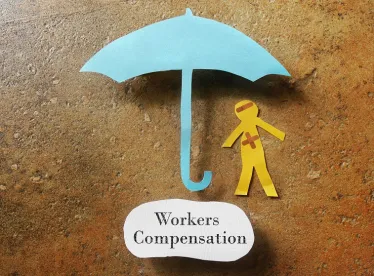The New Jersey Workers’ Compensation Fraud Statute, N.J.S.A. 34:15-57.4, is alive and well in the Division of Workers’ Compensation as it applies to injured workers. Attorneys for workers’ compensation carriers are making fraud arguments often, and in some cases being successful in terminating workers’ benefits. Yet injured workers do not routinely file fraud claims against employers and/or their insurance carriers, who routinely and improperly deny benefits to injured workers. However in this update to an article I wrote previously, I can now happily report that the New Jersey Workers’ Compensation Statute applies to both employees and employers.
The statute specifies that a person shall be guilty of a crime of the fourth degree if the person knowingly or purposely, when making a claim for Workers’ Compensation benefits, makes a false or misleading statement, representation or submission concerning any material fact. The same penalty applies to employers when applying for coverage if they make a false or misleading statement about classification of employees to evade paying full premiums.
In addition, if an employee makes a claim for workers’ compensation benefits and then knowingly makes a false or misleading statement about a material fact the Workers’ Compensation Division may order immediate termination or denial of benefits, and forfeiture of any future benefits/rights. This section of N.J.S.A. 34:15-57.4 is the one getting the most attention and causing the most litigation. Interestingly, the statute also specifies that an employer who improperly denies or delays benefits pursuant to the workers’ compensation statute is liable to pay the sum due and owing plus simple interest. However this part of the statute that applies to the employer is rarely used or applied in practice.
The following fact pattern and recent case law discussed below are examples of how this statute works in practice. For example, an injured worker makes a claim for treatment for a cervical spine injury that happened at work in 2017. The employer’s attorney then discovers a prior cervical MRI from 2007 that showed abnormal cervical disc pathology and files a motion to relieve the employer of any workers’ compensation responsibility under the Fraud Statute. The medical records reveal that the injured worker told all treating physicians that he had a prior 2007 injury to his right shoulder, but did not mention the cervical MRI from 2007. The worker then testifies that he did not recall being told by any prior physicians that he had a cervical injury, and that his understanding was that he had only injured his right shoulder in the 2007 accident.
The issue under the fraud statute is whether the worker’s failure to reveal the prior 2007 cervical MRI to the treating physicians for his 2017 injury was knowingly or purposely making false or misleading statements to obtain workers’ compensation benefits. As petitioner’s attorneys we would argue that the failure to reveal the prior MRI was not fraudulent in any way. Under the facts presented above it is clear that the injured worker told all treating doctors about his prior 2007 shoulder injury. He did not tell the treating doctors for the 2017 injury that he had a prior cervical injury because in his mind he had previously injured his right shoulder, not his cervical spine. It is reasonable to assume that 10 years after an injury a worker would not remember he had a cervical MRI, when he did not have any treatment or have any problems with his cervical spine before the 2017 injury. It is unlikely that the employer would be able to prove that this worker made a false or misleading statement such that he would be found guilty of a crime of the fourth degree under N.J.S.A 34:15-57.4 a. (1) because that section requires proof beyond a reasonable doubt. This same high burden of proof does not apply to the Division of Workers’ Compensation’s ability to terminate a worker’s benefits under section c.(1) of the same statute as will be more fully explained below.
The case of Machiaverna v. City of Newark, decided by the Appellate Division involves a Newark firefighter who filed a workers’ compensation occupational claim in 2008 for repetitive work activities that caused injuries to his left leg, knee and hip. During trial Mr. Machiaverna testified that prior to the claim he filed in 2008 he had injured his left leg at work in 2002, but stated that he had not received any medical treatment after that accident. He never told the workers’ compensation doctors for the 2008 claim anything about this prior injury. It was later learned that Mr. Machiaverna had surgery on his left knee in 2002. The Judge of Workers’ Compensation found that he was not credible because he did not disclose his prior knee injury to the examining doctors, and she dismissed his claim pursuant to N.J.S.A. 34:15-57.4 c.(1).
On appeal Mr. Machiaverna argued that his due process rights were violated because he was deprived of the opportunity to defend himself against the Court’s allegation of fraud. The Appellate Division held that they did not even need to address the fraud issue since the Judge had dismissed the claim for the worker’s failure to sustain his burden of proof that he had sustained any disability through the claimed occupational exposure. Deference was give to the trial Judge who had considered all of the medical testimony, and had made a finding that the medical testimony was undermined by the false and misleading information given by the employee.
The case of Jackson v. Township of Montclair, decided by the Appellate Division just one year earlier, went a step further than the Machiaverna court and imposed penalties on the employee. This is another case where the injured worker not only failed to disclose a prior injury, but actually denied having any prior knee injuries when asked by the treating doctors. Mr. Jackson was involved in a non-work related motor vehicle accident in 2007 where he injured his right knee. He had an MRI and was diagnosed with a tear of the medical meniscus, and although surgery was recommended it was never performed. Subsequently in 2008 he felt a pop in his knee while working and filed a workers’ compensation claim. A new MRI revealed a tear of the medial meniscus. He subsequently told the treating doctors for the work injury that he had never had any prior right knee injuries. The workers’ compensation carrier ultimately authorized knee surgery and paid temporary disability benefits for the time Mr. Jackson was out of work. A month after filing his workers’ compensation claim, Mr. Jackson answered interrogatories in the civil lawsuit for his 2007 motor vehicle accident. In his answers he certified that the 2007 injury to his knee was permanent, that it continued to limit his activities and caused him pain on a daily basis.
At the trial of his workers’ compensation case Mr. Jackson testified that his knee symptoms began after the 2008 workplace accident, and that prior to that accident his knee was feeling great. He testified that he didn’t recall being told that he had a tear in his knee as a result of the prior 2007 car accident. He further testified that some of the answers to his interrogatories were incorrect, and that he didn’t know what he was signing when he signed the certification page. The Judge of Compensation found that his failure to disclose his prior knee injury was a deliberate, calculated and manipulative act that tainted his testimony and served to discredit him. The Judge dismissed his claim pursuant to N.J.S.A. 34:15-57.4(c)(1). Additionally, pursuant to N.J.S.A. 34:15-57.4(c)(2), the Judge ordered Mr. Jackson to repay the money he had received in temporary disability benefits as well as the cost of the knee surgery for a total of $18,390.04. On appeal the petitioner argued that the Judge erred by relying on hearsay evidence to support the finding he knowingly made a false statement to his treating doctors. The Appellate Division affirmed, holding there was competent, credible evidence to support the compensation judge’s determination that employee’s conduct violated the fraud statute.
These cases show the types of serious penalties imposed upon employees who commit workers’ compensation fraud. The same volume of case law imposing penalties against employers who commit fraud does not exist. It is interesting to note that while subsection c.(3) of this section specifically states that an employer who improperly denies or delays benefits is liable to pay the amount due plus interest, as practicing attorneys we never see this subsection of the fraud statute enforced. Going one step further, an attorney or health care provider can also commit workers’ compensation fraud if they assist an individual in fraudulent schemes, participate in double billing or intentionally bill for services that are not legitimately provided.
However in a more recent case an employer in New Jersey was sentenced to 180 days in jail, 150 days of community service, and three years of probation for workers’ compensation fraud. That case involved a roofing company that employed hundreds of people. When the president of the company applied for workers’ compensation coverage he put on his application that he did not employ roofers, nor did his employees engage in the repair of roofs. Based on these statements made in the application process by the president of the roofing company the company paid approximately $400,000 less in workers’ compensation and liability coverage that it would have if it had disclosed that its employees were actually working on roofs.
The president of the roofing company was eventually charged by a State Grand Jury and entered a guilty plea for fraud. This conviction should serve as a warning to employers that they have an obligation to provide adequate and appropriate workers’ compensation coverage or they can be prosecuted for fraud, just like an employee. The victims in this case were the insurance company, New Jersey consumers and the company’s workers who were put in jeopardy due to the company president’s alleged unlawful actions, Acting Insurance Fraud Prosecutor Chillemi said. “The Office of the Insurance Fraud Prosecutor remains vigilant to protecting all victims of insurance fraud.”
While legitimate fraud committed by any party to a workers’ compensation matter is a serious matter, the sensational news about fraud committed by injured workers make headlines and case law. Oftentimes the acts of a few individuals taint the innocence of the majority of injured workers who have legitimate claims, do not commit fraud, and wait long periods of time while their employer improperly denies or delays paying the benefits to which they are entitled.



 />i
/>i

